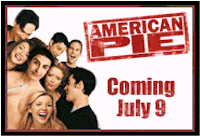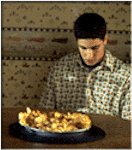|
| |
American Pie
Review by Carrie Gorringe
Posted 9 July 1999
 |
|
Directed by Paul Weitz Starring
Chris Owen,
Thomas DeLonge, Mark Hoppus,
Travis Barker, Jason Biggs,
Jennifer Coolidge, James DeBello,
Shannon Elizabeth, Alyson Hannigan,
Chris Klein, Eugene Levy,
Natasha Lyonne, Eli Marienthal,
Thomas Ian Nicholas, Tara Reid,
Woody Schultz, Mena Suvari,
Eddie Kaye Thomas, and Seann William Scott
Screenplay by Adam Herz |
For reasons unknown to anyone with common sense, it
has been rumored that the Weitz brothers (director Paul and producer Chris) are about to
join Peter and Bobby Farrelly (Kingpin, There’s Something About Mary)
in the gross-out pantheon of filmdom. Certainly, the Weitzes have what often passes in the
entertainment industry for credentials: an appropriate pedigree. They are the grandsons of
legendary 30s agent Paul Kohner (he could count John Huston, and Billy Wilder, among
others, among his clientele), and the sons of Susan Kohner (best known as Juanita
Moore’s daughter in the Douglas Sirk remake of the Fannie Hurst potboiler, Imitation
of Life) and fashion designer John Weitz, Paul and Chris, we are told, also wrote the
script for Dreamworks’ first animated feature, Antz. With a backstory like
this, and evidence of profitability to boot, it’s no wonder that a major studio
– in this case, Universal -- raced to greenlight anything these two were willing to
put forward.
 However,
there’s one member of the Weitz’ family tree who doesn’t get mentioned in
their bio: their Mexican-born grandmother, Lupita Tovar, who also worked for Universal and
who was cast as the lead in the Spanish-language version of Dracula in 1931 (it was
a common practice in the early sound era, with the demise of interchangeable title cards,
to make different versions of the same film for export, often with different casts and a
different director). Her appearance was infinitely unforgettable, thanks to the diaphanous
nightgown that comprised her wardrobe in one key scene (attempts were made, in these
different versions, to accommodate what was considered to be the different "cultural
sensibilities" of each target audience). Even in the pre-Code era, this was a fairly
steamy situation for a nice Catholic girl to find herself in. The future Mrs. Kohner was a
gutsy woman. However,
there’s one member of the Weitz’ family tree who doesn’t get mentioned in
their bio: their Mexican-born grandmother, Lupita Tovar, who also worked for Universal and
who was cast as the lead in the Spanish-language version of Dracula in 1931 (it was
a common practice in the early sound era, with the demise of interchangeable title cards,
to make different versions of the same film for export, often with different casts and a
different director). Her appearance was infinitely unforgettable, thanks to the diaphanous
nightgown that comprised her wardrobe in one key scene (attempts were made, in these
different versions, to accommodate what was considered to be the different "cultural
sensibilities" of each target audience). Even in the pre-Code era, this was a fairly
steamy situation for a nice Catholic girl to find herself in. The future Mrs. Kohner was a
gutsy woman.
Unfortunately, her grandsons don’t possess that same out-on-a-wire mindset, opting
instead for the safe – and, by contemporary standards, entirely predictable -- path
of grafting some vulgar if predictable one-offs involving food, drink and bodily fluids
onto the eminently forgettable antics of a group of high-school seniors who need to get
their cherries popped before the senior prom. From the first situation involving beer and
semen -- I’m giving nothing away here -- it’s obvious that the brothers Weitz
(and their co-conspirator, first-time screenwriter Herz) are aiming right at the heart of Mary
Territory (where, it will be recalled, the viscous properties of ejaculate are put to
effective, if unintended, use as hair gel).  But the Weitzes and Herz don’t and can’t provide the same
guilty-pleasure effect that a Farrelly film can, for the simple reason that the Farrellys,
after the more manic and puerile antics are stripped away from their films, actually
present coherent stories, likeable characters and talented actors. In short, the Farrellys
like their audience, and their characters, and it shows. By contrast, the Weitzes dish up
nothing more than a Porky’s retread larded with inane characters and
situations that telegraph their unfunny intentions at least a league away, then turn
around in the final reel and ask the audience to accept some implausible and sentimental
twaddle about personal growth. On top of all this, the script borrows a subplot twist from
a coming-of-age film that the parents of Pie’s target audience made into one
of their own anthems for autonomy (Mike Nichols’ The Graduate). and there are
obvious hopes that dredging up referential irony and transplanting it, almost whole and
unchanged, will act as a dropcloth behind which a lack of craftsmanship can huddle; call
it artfulness disguised as art. Despite all of their best efforts, the filmmakers’
discomfort with their own artificial concoction is palpable, as if they know they’re
pandering to an audience whose attitudes they believe to be beneath them, and the overall
effect on screen is like a shot of saccharine to the taste buds: sickly-sweet, then
repellant. But the Weitzes and Herz don’t and can’t provide the same
guilty-pleasure effect that a Farrelly film can, for the simple reason that the Farrellys,
after the more manic and puerile antics are stripped away from their films, actually
present coherent stories, likeable characters and talented actors. In short, the Farrellys
like their audience, and their characters, and it shows. By contrast, the Weitzes dish up
nothing more than a Porky’s retread larded with inane characters and
situations that telegraph their unfunny intentions at least a league away, then turn
around in the final reel and ask the audience to accept some implausible and sentimental
twaddle about personal growth. On top of all this, the script borrows a subplot twist from
a coming-of-age film that the parents of Pie’s target audience made into one
of their own anthems for autonomy (Mike Nichols’ The Graduate). and there are
obvious hopes that dredging up referential irony and transplanting it, almost whole and
unchanged, will act as a dropcloth behind which a lack of craftsmanship can huddle; call
it artfulness disguised as art. Despite all of their best efforts, the filmmakers’
discomfort with their own artificial concoction is palpable, as if they know they’re
pandering to an audience whose attitudes they believe to be beneath them, and the overall
effect on screen is like a shot of saccharine to the taste buds: sickly-sweet, then
repellant.
American Pie isn’t brave, scathing black humor about the miseries of high
school and adolescence, but reheated day-olds served up with contempt and cowardice. It
wastes the talents of its reasonably talented cast (notably Natasha Lyonne from Slums
of Beverly Hills, now really slumming, and Eugene Levy), not to mention the time of
its audience. Nevertheless, it will probably make an obscene amount of money, because no
one ever went broke in Hollywood by telling an audience what it wanted to hear.
Contents | Features | Reviews
| Books | Archives | Store
Copyright © 1999 by Nitrate Productions, Inc. All
Rights Reserved.
| |
|